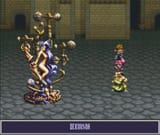Treasure of the Rudras does mostly standard JRPG stuff excepting a few big gimmicks, one of which is that its spells are nonsense words that any person in its world can chant in order to cast spells, and although people with talent and training are much better at spellcasting than those without, the main thing that separates a mage from a normal person is that the mage knows which words make good spells. In reality this makes little sense (people would discover and publish all the spells within weeks) but in simplistic JRPG-land it works and is cool. Your characters don't really learn spells in the game world; instead you the player learn them in the real world, when the game gives you clues about what their names are (for example, when an enemy casts one in front of you).
All spells are available at the start of the game, though some may cost too many MP to be used. Speedrunners can use this system to demolish the balance of the game, but during casual play it works perfectly well, although it's somewhat lame that ALL your characters effectively know all the same spells as one another at any given moment. You can make up whatever spell names you like and they will all function in battle somehow, albeit only poorly in most cases; the game does a surprisingly not completely terrible (though it isn't very good) job of implementing some sort of systematic magical language in which related nonsense-words will often have related magical effects. So you can perform crude science by tweaking spell names in ways that are suggested by patterns you see across multiple names and then casting the resulting spells to see whether you've improved them.
It's not a deep enough system to be all that much more than a gimmick, but it's a great gimmick. A game that took the concept much more seriously, and applied modern technology to it rather than the barely sufficient CPU of the SNES, might do some amazing things with it.
4chan Search
1 results for "8d6a7e3344cc68c4f169036b0d1d020c"
